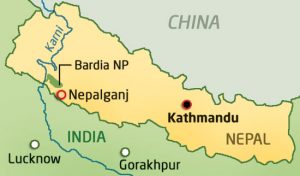Daughter, Granddaughter, Sister, Cousin, Aunt, Niece. I am all of those things at once. Which one is my primary identity? Before my trip to Bardiya last week, I never thought about the answer to that question. Now, that question is at the forefront of my consciousness.
On November 22, 2006, the government of Nepal and the Communist Party of Nepal (Maoists) signed a Comprehensive Peace Agreement, bringing the ten year conflict to an end. After many political challenges, the government finally established the Truth and Reconciliation Commission (TRC) and the Commission on Investigation on Enforced Disappeared Persons (CIEDP) in February 2015. CIEDP has registered 3000 complaints related to enforced disappearances since its inception. NEFAD’s records indicate that at least 1350 people were forcibly disappeared.
Nyaya, or justice, includes truth, prosecutions, psychosocial support, and financial reparations. Of the 1350 families of the disappeared, approximately 300 have not yet received the official reparation amount of $10,000 USD. Quests for the truth about the forcibly disappeared involve exhumations of suspected mass grave areas which require time, financial resources, and appropriate personnel. Similarly, providing psychosocial support requires significant resources. To pursue prosecutions, there need to be laws criminalizing enforced disappearance, a drastic change in the culture of impunity, and significant political support. Therefore, financial reparations are the most concrete, least costly, and the least controversial form of justice the government can provide, hence their willingness to cooperate on that front.
The primary reason approximately 300 families have not yet received the reparation amount is internal family conflict and complexity that creates uncertainty about the appropriate recipient of the reparation money. If a woman’s spouse was disappeared and she remarries, she is considered a part of the new family and no longer eligible for the reparations. Reparations may go to the biological family of her former husband. Her loss, her suffering, and any other hardship she may have experienced as a result of losing her spouse is immediately discounted.
Radhe Krishna Tharu’s (left) daughter, Sita Tharu, was forcibly disappeared and killed. Here he is discussing reparations cases with Sarita Thapa (right) of NEFAD.
Another complicated case involves a son and daughter who were disappeared. Both were married and had their own families. After their disappearance, each of their spouses claimed for the reparation amount to support their families. In addition, the son and daughter’s parents also claimed for the reparation amount since they no longer have children to financially support them as they age and experience health issues. All of their claims are valid. Which identity of the forcibly disappeared individual should be prioritized? Son, husband, or father? Daughter, wife, or mother? Which relationship warrants the reparation amount?
While these cases have not yet been resolved, NEFAD has been working with the CIEDP to advocate for more thoughtful, gender sensitive policies and practices in regards to reparations. After my conversations with Sarita and Prabal, I know NEFAD will continue it’s incredibly important community-based advocacy work to ensure that each family’s case is thoughtfully resolved. If there’s anything I’ve learned about reparations policies and practices, it’s how important identity is. What happens when someone can’t be all their different identities simultaneously? Which identity should be prioritized?
Posted By Komal Thakkar (Nepal)
Posted Jul 4th, 2018




6 Comments
iain
July 5, 2018
Excellent blog, which shows that transitional justice is not always barred by callous bureaucracy or military impunity. Who actually adjudicates in such cases and does it work? Can NEFAD play a role? That would make a fascinating follow-up blog.
Corinne Cummings
July 6, 2018
Komal, phenomenal blog post. Thanks for getting this up for all to read and enjoy! Your words hit home, as I did not know the extent of these issues in Nepal with the families of the forced disappearances. I can now see how one’s identity plays a crucial part for those who lost their family members. I appreciate your informative posting. I was under the impression that it was primarily men who forcibly disappeared, did many women forcibly disappear as well? I am sorry for Radhe Krishna Tharu’s loss; I hope the family gains the reparations and closure they deserve. Thank you for giving these families justice through your thoughtful words, it’s great that you can pass on their stories to call attention to the injustices these families endure. Please continue on with the fantastic work; I look forward to your next blog post. Best wishes, Corinne.
Samantha
July 9, 2018
Komal, what an engaging blog. This post provokes the question about identity and who/what can play a role in the interpretation of how reparations are seen. I agree with Iain, this would make an interesting follow-up blog. Thanks again for sharing, I look forward to reading more about this thought of yours.
Ali
July 10, 2018
What an interesting post, Komal. I better understand what an important role identity plays in this situation – I am looking forward to following your work to see how these questions are interpreted.
Donna Olson
July 10, 2018
What a thoughtful article and title! The question of identity and having to question which family member has been the most affected by the disappearance is both fascinating and heartbreaking! I would love to hear more about if and how NEFAD is helping to navigate this.
Princia Vas
July 16, 2018
Komal, this blog made for a fantastic read. I love how all your blogs raises important questions that sometimes we fail to think about! Keep up the good work and I look forward to reading more of your thought provoking blogs:)